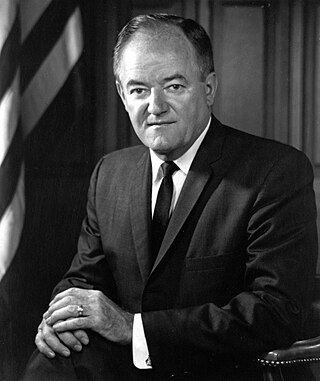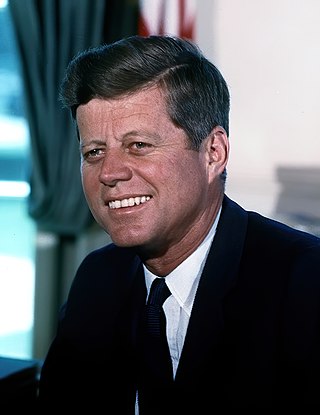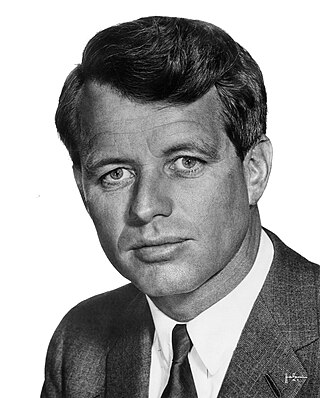This article needs additional citations for verification .(July 2022) |
This section of the timeline of United States history concerns events from 1950 to 1969.
This article needs additional citations for verification .(July 2022) |
This section of the timeline of United States history concerns events from 1950 to 1969.



The 1960s was a decade that began on January 1, 1960, and ended on December 31, 1969.

The 1964 United States presidential election was the 45th quadrennial presidential election. It was held on Tuesday, November 3, 1964. Incumbent Democratic President Lyndon B. Johnson defeated Senator Barry Goldwater, the Republican nominee, in a landslide. Johnson was the fourth and most recent vice-president to ascend to the presidency following the death of his predecessor and to win a full term in his own right. With 61.1% of the popular vote, Lyndon B. Johnson won the largest share of the popular vote for the Democratic Party in history, and the highest for any candidate since the advent of widespread popular elections in the 1820s.

The 1968 United States presidential election was the 46th quadrennial presidential election, held on Tuesday, November 5, 1968. The Republican nominee, former vice president Richard Nixon, defeated both the Democratic nominee, incumbent vice president Hubert Humphrey, and the American Independent Party nominee, former Alabama governor George Wallace. This was the last election until 1988 in which the incumbent president was not on the ballot. This was also the last election where a third-party candidate received an electoral vote.

Hubert Horatio Humphrey Jr. was an American politician and statesman who served as the 38th vice president of the United States from 1965 to 1969. He twice served in the United States Senate, representing Minnesota from 1949 to 1964 and 1971 to 1978. As a senator he was a major leader of modern liberalism in the United States. As President Lyndon B. Johnson's vice president, he supported the controversial Vietnam War. An intensely divided Democratic Party nominated him in the 1968 presidential election, which he lost to Republican nominee Richard Nixon.

Lyndon Baines Johnson, often referred to by his initials LBJ, was an American politician who served as the 36th president of the United States from 1963 to 1969. He became president after the assassination of John F. Kennedy, under whom he had served as the 37th vice president from 1961 to 1963. A Democrat from Texas, Johnson also served as a U.S. representative and U.S. senator.
The year 1968 in television involved some significant events. Below is a list of television-related events in 1968.

The Pentagon Papers, officially titled The History of U.S. Decision-Making in Vietnam, 1945–1968, is a United States Department of Defense history of the United States' political and military involvement in Vietnam from 1945 to 1968. Released by Daniel Ellsberg, who had worked on the study, they were first brought to the attention of the public on the front page of The New York Times in 1971. A 1996 article in The New York Times said that the Pentagon Papers had demonstrated, among other things, that Lyndon B. Johnson's administration had "systematically lied, not only to the public but also to Congress."

Ralph Webster Yarborough was an American politician and lawyer. He was a Texas Democratic politician who served in the United States Senate from 1957 to 1971 and was a leader of the progressive wing of his party. Along with Senate Majority Leader Lyndon B. Johnson and Speaker of the House Sam Rayburn, but unlike most Southern congressmen, Yarborough refused to support the 1956 Southern Manifesto, which called for resistance to the racial integration of schools and other public places. Yarborough voted in favor of the Civil Rights Acts of 1957, 1960, 1964, and 1968, as well as the 24th Amendment to the U.S. Constitution, the Voting Rights Act of 1965, and the confirmation of Thurgood Marshall to the U.S. Supreme Court. Yarborough was the only senator from a state that was part of the Confederacy to vote for all five bills.

John Sherman Cooper was an American politician, jurist, and diplomat from the United States. He served three non-consecutive, partial terms in the United States Senate before being elected to two full terms in 1960 and 1966, representing Kentucky. He also served as U.S. Ambassador to India from 1955 to 1956 and U.S. Ambassador to East Germany from 1974 to 1976. He was the first Republican to be popularly elected to more than one term as a senator from Kentucky and, in both 1960 and 1966, he set records for the largest victory margin for a Kentucky senatorial candidate from either party.

Thruston Ballard Morton was an American politician. A Republican, Morton represented Kentucky in the U.S. House of Representatives and the U.S. Senate.

John James "Whispering Willie" Williams was an American businessman and politician from Millsboro, Delaware. He was a member of the Republican Party and served four terms as U.S. senator from Delaware from 1947 to 1970.

John Fitzgerald Kennedy, often referred to as JFK or Jack, was an American politician who served as the 35th president of the United States from 1961 until his assassination in 1963. He was the youngest person elected president. Kennedy served at the height of the Cold War, and the majority of his foreign policy concerned relations with the Soviet Union and Cuba. A Democrat, Kennedy represented Massachusetts in both houses of the U.S. Congress prior to his presidency.
United States involvement in the Vietnam War began shortly after the end of World War II in Asia, first in an extremely limited capacity and escalating over a period of 20 years. The U.S. military presence peaked in April 1969, with 543,000 American combat troops stationed in Vietnam. By the conclusion of the United States's involvement in 1973, over 3.1 million Americans had been stationed in Vietnam.

Lyndon B. Johnson's tenure as the 36th president of the United States began on November 22, 1963, upon the assassination of president John F. Kennedy, and ended on January 20, 1969. He had been vice president for 1,036 days when he succeeded to the presidency. Johnson, a Democrat from Texas, ran for and won a full four-year term in the 1964 presidential election, in which he defeated Republican nominee Barry Goldwater in a landslide. Johnson did not run for a second full term in the 1968 presidential election because of his low popularity. He was succeeded by Republican Richard Nixon. His presidency marked the high tide of modern liberalism in the 20th century United States.

John F. Kennedy's tenure as the 35th president of the United States began with his inauguration on January 20, 1961, and ended with his assassination on November 22, 1963. Kennedy, a Democrat from Massachusetts, took office following his narrow victory over Republican incumbent vice president Richard Nixon in the 1960 presidential election. He was succeeded by Vice President Lyndon B. Johnson.

Robert Francis Kennedy, also known by his initials RFK and by the nickname Bobby, was an American politician and lawyer. He served as the 64th United States attorney general from January 1961 to September 1964, and as a U.S. senator from New York from January 1965 until his assassination in June 1968, when he was running for the Democratic presidential nomination. Like his brothers John F. Kennedy and Ted Kennedy, he was a prominent member of the Democratic Party and is an icon of modern American liberalism.

The United States faced multiple waves of political violence during the Cold War. The first would occur as a result of the reemergence of the Ku Klux Klan in 1950, in opposition to the growing civil rights movement, which sought an end to racial segregation and other forms of institutional racism. The new Klan also gained a new anti-communist and neo-fascist element, in response to the rise of anti-communist ideas in American society as a result of the Red Scare. Other white supremacist organizations would arise at the same time, such as the American Nazi Party. In Puerto Rico, the Puerto Rican Nationalist Party would launch a series of revolts throughout the 50s, including an attempted assassination of Harry S. Truman. In the early 60s, standoffs between federal and state governments would result in events such as the Little Rock Crisis and the Ole Miss riot of 1962.